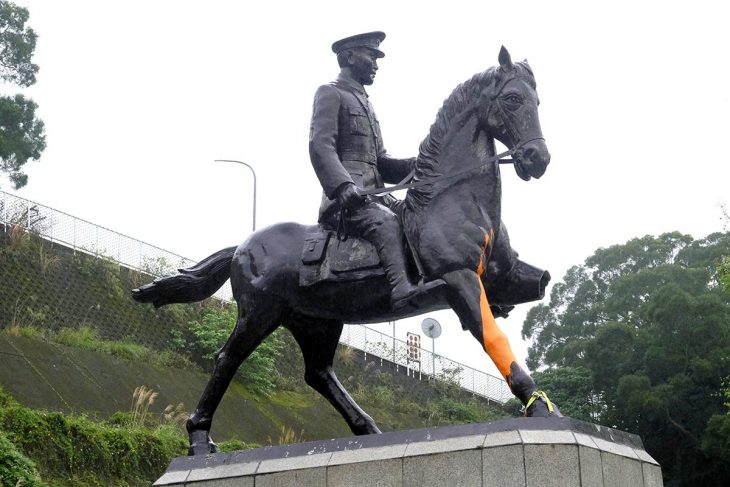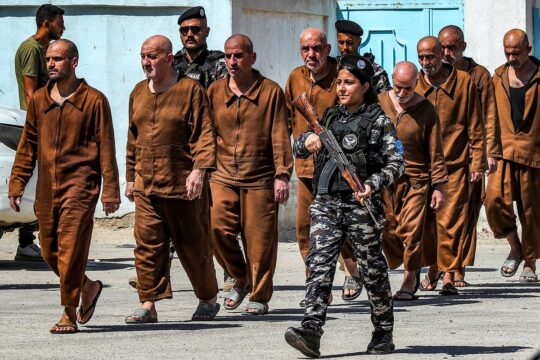The 2016 general elections marked a turning point in Taiwan's history. For the first time, not only the country's presidency but also the Legislative Yuan (acting as parliament) came under the control of the "green camp" led by the DPP. The DPP is a coalition espousing Taiwanese nationalism to a greater or lesser extent depending on the different groups that compose it, and has a moderate line. It had already won the presidency of the Republic between 2000 and 2008. But at the time, Chen Shui-bian, the first president from the ranks of the DPP, had to work with the opposition led by the Kuomintang (KMT) and its allies within the "blue camp," a coalition promoting Chinese nationalism, which had retained a parliamentary majority.
So when she won in 2016, President Tsai Ing-wen had considerable room for manoeuvre and could implement ambitious reforms without having to obtain the agreement of the opposition. One of the themes of her campaign was the full realization of transitional justice, a theme that still divides the two camps today. For the KMT, this is not a priority issue since, according to them, three laws adopted in the 1990s have already created an institutional framework for granting compensation and other symbolic recognition to the victims of the authoritarian regime which, with the KMT at its head, ruled the island from 1945 until the beginning of democratisation in 1987. However, for various civil society actors and members of the "green camp", these laws were not enough.
One of the major issues absent from the initiatives voted during democratization was the question of the legitimacy of the assets owned by the KMT and other organisations formerly close to the regime. It is at the heart of the law "governing the settlement of ill-gotten properties by political parties and their affiliate organisations" (or “law on ill-gotten gains”) adopted in July 2016. This first text was strengthened in 2017 by the adoption of the law on political parties, regulating the funding of political organizations - which can no longer be at the head of for-profit organisations - and election campaigns.
Legal framework impossible before 2016
Although it took until 2016 for this issue to receive significant attention in Taiwan, including in the media, it had been raised since the early 1990s. Members of the then opposition "green camp" had called the government to account, pointing out that the KMT's finances were a matter of public interest, given that the party had accumulated a large amount of assets during the authoritarian era and that these assets could undermine the proper functioning of the emerging democratic system. Indeed, at that time there were no binding measures regulating the finances of political parties and their election expenses. Despite repeated calls and the publication of books on how the KMT sold its assets at the time, the KMT refused to grant an external authority a right of inspection over its possessions.
After the presidential election in 2000, which marked a first change of power, the new administration had already carried out a census of public assets to determine their trajectories since 1945. In 2001, it presented a bill on the regularisation of KMT property, which was rejected by the KMT in its first reading in parliament and was therefore not debated. The Chen administration has been constantly pushing it. While rejecting the DPP initiative, KMT reacted by acknowledging its participation in certain companies in the cultural and financial sectors, publishing balance sheets, selling real estate and promising to solve the problem. But it did not propose setting up an independent oversight mechanism and, after regaining control of the executive branch after its victory in the 2008 presidential elections, did not take any significant initiatives before losing power again in 2016. During this period, an association led by intellectuals and public figures that had taken part in the Chen administration's attempts to regulate KMT's assets, sought to ensure that the issue did not disappear from public debate, in particular by publishing archives it had been able to collect between 2000 and 2008.
Creation of an ill-gotten gains commission
The law on ill-gotten gains was adopted five months after the new parliament elected in January 2016 took office, a very short time given the complexity of the issue. In fact, the newly elected government was able to act quickly because the law takes up most of the text promoted by the DPP between 2000 and 2008. Although not explicitly stated, the law targets the KMT and its affiliated organisations which have one year from the passing of the law to declare all their income and assets. Those defined as illegitimate - i.e. according to Article 4 of the law " assets the political parties have either acquired for themselves or allowed their affiliated organizations to acquire through conducts which are against the nature of political parties and the principles of democracy and the rule of law” - are to be nationalized. Article 5 stipulates that the only legal sources of income of parties are "membership fees, political contributions, donation of campaign funds, government election expenses subsidies and its interests”.
The issue of the law's enforcement is addressed in its second article, which defines the statutes of a commission in charge of its application. As an independent body affiliated to the Executive Yuan, i.e. the Presidential Palace, this Ill-Gotten Party Assets Settlement Committee has a mandate to investigate whether a particular group is a former affiliate of the authoritarian State, whether it has benefited from its position to receive material benefits and, if so, whether it possesses illegitimate assets that should be nationalized. Its prerogatives remain moderate. First of all, parliament has a right of oversight on its work. Also, while the commission can demand access to the archives of an entity it is investigating, it can only impose a fine if that entity refuses to cooperate. Finally, its decisions may be appealed to the administrative court.
Kuomintang account frozen
Of the investigations carried out by the Commission, we shall mention the two most emblematic. The first is the Kuomintang's assets. As the daily Taipei Times pointed out, the day after the ill-gotten gains law was passed, the party issued ten cheques for 52 million new Taiwanese dollars (NTD) [about 1.5 million euros] each, which immediately triggered an investigation. In the meantime, one of the ten cheques had already been cashed and the amount spread over 200 different accounts. The commission, which then estimated that the party had 630 million NTD in legitimate assets and 1,932 billion NTD in illegitimate assets, decided to freeze the party's account, which it could now use only for deposits. From 2017, however, complaining that it could no longer pay its 300 employees, KMT stepped up calls for donations and the sanction was relaxed. The party has the right to use its account to pay its salaries.
In 2018, the commission published the preliminary findings of its investigation into KMT's finances and stated that KMT had a total of 18.9 billion NTD in assets (approximately 560 million euros). By way of comparison, the DPP's assets at the time were 769 million NTD. Of this total, 15.6 billion NTD was said to be held by two companies founded by KMT during the authoritarian era, which are now legally separate but with which KMT has a sufficiently close relationship to be defined in the same report as ill-gotten assets. The party was also ordered to return a luxury hotel it owned in Palau and to shed light on the use of funds obtained after the sale of several assets when Chen was in power.
National Women’s League, a typical affiliate organisation
The second emblematic case concerns the National Women's League. Founded in 1950 by Soong Meiling, wife of former Kuomintang head and Taiwanese president Chiang Kai-shek, the League is a charitable organization dominated by the wives of high-ranking personalities linked to the KMT. In March 2019, it was designated as an “affiliate organisation”, its accounts were frozen and the commission ordered it to return 38.7 billion NTD (about 1.15 billion euros), which was considered ill-gotten because it came from a tax (not named as such) imposed between 1955 and 1989. During those four decades, companies trading abroad had to pay on average 0.5 NTD for each US dollar of imported goods. The amount gathered went to associations concerned with the welfare of former military personnel and to the National Women's League. The League reportedly obtained 13.9 billion NTD between 1957 and 1994 to take care of former soldiers' housing and 30 billion NTD in interest generated by its assets between 1990 and 2016.
To demonstrate the link between the former regime and the League, the commission worked mainly on the basis of KMT records showing that its members had permanent access to the party’s Central Committee and that they participated in meetings central to the functioning of the party. Although legally separate from the KMT, the League was in fact closely linked to it during the authoritarian era, enabling it to build up a considerable fortune. This decision came after a year of negotiations between the League and the commission, a period which showed the limits of the latter's prerogatives. It has thus never managed to obtain all the documents in the League's possession relating to its assets and transactions, the commission’s team noting that part of the archives had been removed before their inspection.
Judicial battle still under way
The Kuomintang, the League and other entities that were designated as organizations affiliated to the former single-party regime (such as the former Anti-Communist Youth League, which was detached from the KMT at the beginning of democratization but still retains considerable land and financial assets) have repeatedly challenged each commission decision before the Taipei Administrative Court, with the commission itself challenging the court's judgements if they were unfavourable to it. All these appeals have led to a fierce legal battle, in which the commission's decisions have been upheld, overturned and reinstated. Tired of battle, the court requested arbitration by the High Constitutional Court, which must now rule on the constitutionality of the ill-gotten gains Act. It has announced that it will make its ruling public by the end of August at the latest.
If one disregards the historical context and takes a narrow reading of the law, then the Kuomintang, like the League, had no formal links with the former authoritarian regime. The former authoritarian regime, although effectively a single party system, maintained a facade of multipartyism and the League was never formally associated with the government or the KMT. On the other hand, a simple consultation of the KMT archives and public archives dating from the former regime suffices to show that these groups were, in fact, extremely financially linked to each other, owing to the KMT's hold on power and the privileges it granted to certain entities. They now possess considerable assets, which are not commensurate with their place in Taiwanese society or with the probity that should characterize a functioning democratic system.
German model
The commission, like its critics, uses two lines of argument. The first is domestic. The commission has organized several conferences in homage to Fu Chen, an intellectual who, originally a member of the KMT, ended up publicly criticizing the authoritarian nature of the post-war regime. He also published an article in which he accused the party of monopolizing the country's wealth, which, in the commission's view, attests to predatory behaviour on the part of the KMT at the time. He was subsequently imprisoned for six years for spreading anti-government ideas. The KMT, while acknowledging the injustice suffered by Lei Chen, argues that his family has been compensated, his reputation has been restored and the context of the Cold War cannot be put on the same level as today's. The end somehow justified the means and the country was then under martial law.
The second line draws on the German experience, specifically legislation on assets of the former East German Communist Party, adopted during and after reunification. Since 2016, the current government has stepped up exchanges with Germany, whose experience in transitional justice is often put forward to support post-2016 measures in Taiwan. This link is particularly important in relation to the issue of ill-gotten gains, and at its inception the commission drew heavily on it. The commission has increased its exchanges with members of the former German committee, arguing that like them they must start from scattered sources to trace the trajectories of different types of assets, at the same time dealing with a former single party and its organizations. The KMT, for its part, argues that since the legislative frameworks are extremely different, comparison is not possible and that this is a blatant example of manipulation by the "green camp ". Indeed, the modalities of German reunification were not replicated in Taiwan in the 1990s, as the former Communist Party of the GDR was simply dissolved. Since 2016, the KMT has also increased its exchanges with German experts, and has sent a delegation to Germany to meet the institutional actors in charge of transitional justice. It has been able to obtain, it points out, opinions supporting its claim of abuse of power by the current government.
However, both sides converge on one thing. They are both calling in a more or less selective way on foreign, supposedly objective experts to validate their own positions, which reflect the paradoxes of the island’s democratization. Today, it is welcome that some KMT cadres recognize the importance of making party assets transparent and liquidating the undue legacies of the authoritarian era. One can only regret, however, that the "blue camp" did nothing tangible when it had the legal means to do so, which naturally leads us to question the sincerity of this new position.
 VLADIMIR STOLOJAN-FILIPESCO
VLADIMIR STOLOJAN-FILIPESCO
Vladimir Stolojan-Filipesco is a post-doctoral researcher at the Institute of Sociology of the Academia Sinica in Taipei. He defended his thesis at the University Paris Diderot in Paris in September 2017 on the development of national memory in Taiwan, and more particularly remembrance policies in relation to the one-party regime established by the Kuomintang after 1945. As a follow-up to this research, he has, within the Taiwan Foundation for Democracy and the Chiang Ching-kuo Foundation for International Scholarly Exchanges, carried out surveys on transitional justice measures after 2016. He is now working on issues related to the teaching of history.





